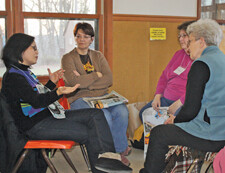
Call to the River' creates new kind of church community
Twenty-nine people gathered recently at the river at Manidokan, a United Methodist retreat center near Harper's Ferry, to explore God's call and discover new ways of being church.
"I want the church to talk to me in curious ways," one participant confessed. Curiosity, openness, wonder and mystery became by-words of the weekend.
 The Call to the River retreat was the soul-child of the Rev. Rod Miller, director of connectional and emerging ministries for the Baltimore-Washington Conference.
The Call to the River retreat was the soul-child of the Rev. Rod Miller, director of connectional and emerging ministries for the Baltimore-Washington Conference.
The "emerging" part of his title is new and Miller is gathering strategic partners, like Faith at Work (www.lumunos.org), and the Church of the Savior in this instance, to help him discover more about how United Methodists might relate to the emerging church community, which is unfolding on the mainstream religious landscape.
During the retreat, Miller and the Rev. Matt Poole, a Guide in the Western Region, asked participants to reflect upon the Bible's first story and how much space God created.
"Now consider how much sacred space you claim," Poole said. "We sometimes tend to live small lives. But there's an immensity to God."
Poole encouraged those present to step into the spaces God is creating in their lives.
The church, Miller explained, also needs to invite people into that sacred space. One way to do this, he said, is to move beyond transactional models of ministry, which focus on the trading of goods, services and ideas, and into an emerging model, in which people are valued for who God created them to be, leadership is shared and possibility is not bound by structure or expectation.
One of the first steps in such a journey, Miller said, is to connect one's own story with God's larger story.
To assist those gathered in this task, Marjory Zoet Bankson, author of "Call to the Soul," was invited to help people explore "the call cycle," which she designed to help people realize the larger purposes of their lives as they unfold and to move them into the realm of the Spirit.
"Now what?" is one of the central questions of call, explained Bankson. Throughout their lives, people will discover new answers to the questions of who am I, what is my work, what is my gift, what is my legacy.
Each call, Bankson explained, takes a person through a cycle with various stages including resistance, reclaiming, revelation, relating and release. As they consider taking their calls public, people find themselves on the banks of a metaphorical river, which they cross at their own peril or delight.
While each call is different, they do share common traits. "A calling from God is simple," Bankson said. "It is impossible without God and it is persistent."
In examining call for individuals and the church, Bankson read from Ezekiel 47, where an angel reveals a vision in which a river flows out from below the Temple, creating a mighty force that brings life wherever it goes. Fruit trees grow on its banks, "and their fruit will be for food, and their leaves for the healing of the nations."
 "The river flows from the sanctuary, and where the river flows, life abounds," Bankson said. The Temple was a closed system. But God's river flows from under the Temple and into the world. It doesn't ignore the Temple, but it is more. It's a bigger story."
"The river flows from the sanctuary, and where the river flows, life abounds," Bankson said. The Temple was a closed system. But God's river flows from under the Temple and into the world. It doesn't ignore the Temple, but it is more. It's a bigger story."
This Scripture resonated with many present at the retreat. Some said the church couldn't effectively address the things that "made them feel dead inside." Others worried that the church had become trivial and irrelevant, "a bad parody of what it was intended to be."
But Miller reminded them that they hold the key to address this. Each person is beloved by God. "The river," he said, "flows through us."
Participants were invited to listen to their bodies as they participated in a wide variety of sacred experiences, ranging from stretching and dance, the intoning of Shalom and holy conversation to walking group meditations and Communion.
During one of these exercises, Tiffany Montavon, from Faith at Work, asked those gathered to close their eyes and imagine placing their dreams in their left hand and God's dream in their right. "Now place your left hand in your right and let it rest there," she instructed.
In that merging of individual, God's and the church's dreams, a new spirit stirred. No one present was ready, or even able, to define it. But that's okay, Miller says. God's river brought forth life and new callings were awakened.

Login/Register to leave comment